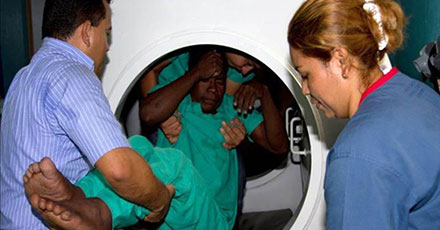Kelsie, a molecular biology major from Wyoming, traveled to Honduras to work in the La Bendicion clinic, learn about hyperbaric medicine, and to study the situation of the Miskito lobster divers. This trip allowed Kelsie to learn about hyperbaric medicine in the most extreme cases in one of the busiest hyperbaric chambers in the world. She gained hands-on experience monitoring patient vital signs, gained a new appreciation for the Fair Trade movement, and a more full comprehension of the severity of the global problem of consumerism and exploitation.

Hyperbaric chamber in Honduras.
Kelsie’s Advice for Future AMS Researchers:
Start early: Planning this fellowship while I was abroad was difficult. This is why I would suggest starting early if you know you are going abroad or trying to write the proposal over the summer
Be safe: The most difficult part of my project was ensuring that I was aware of and accounted for the various safety concerns, as Honduras is a moderately dangerous country. Make sure you do your research about wherever you may be travelling and take necessary precautions to keep yourself safe.
Budget extra: It is also important to allow yourself some wiggle room in budgeting for any extra fees like the exit fee that I was charged in the airport to leave the country, or currency exchange rates.
Be flexible: Also, make sure you are flexible in your plans. I had intended to travel to the Moskito Coast to experience the lifestyle of the Miskito natives and speak to members of the community; however, that aspect of my proposal had to be abandoned due to recent DEA activity in the area that led to serious safety concerns. If you allow some wiggle room, you will be able to take advantage of new things that arise and will be able to come up with new ideas when your original plans fall through.
Think about your skills: Think of what you have learned in your classes and the skills that you have. These can come in handy when deciding whether you want to do a quantitative or qualitative study, how you will gather data, and where you want to go or what you want to study. Also consider qualifications that you have or can obtain that may limit your ability to do certain tasks. Finally, consider your long-term goals and try and match the study goals with your interests.

